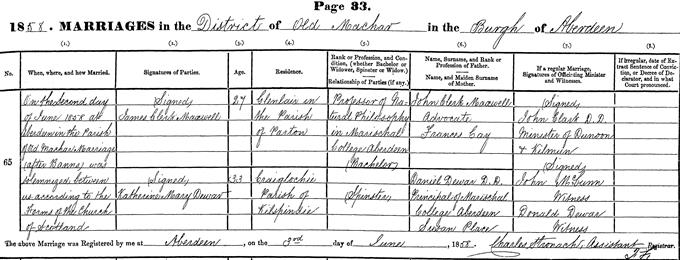James Clerk Maxwell (1831-1879)
James Clerk Maxwell (1831-1879)
Physicist
James Clerk Maxwell was one of the nineteenth century's greatest scientists. He studied natural and moral philosophy at the University of Edinburgh. In 1850 he moved to Cambridge University, where he graduated in 1854 in mathematics. From 1856 he held the chair of Natural Philosophy at Marischal College, Aberdeen, but his appointment was not continued when the two university colleges merged in 1860. In that year he became a professor at King's College, London, and in 1861 he was elected to the Royal Society. His main discoveries were in electricity and magnetism; and the kinetic theory of gases. He published many works including 'Theory of heat' and 'Matter and motion'. In 1871 he returned to Cambridge as Cavendish Professor of Physics, and it was there that he died in 1879 at the age of 48.
Birth in 1831
James Maxwell was born in Edinburgh on 13 June 1831, the son of John Clerk Maxwell of Middlebie, advocate, and Francis Cay, St Stephens parish. His entry in the Old Parish Register (OPR) for Edinburgh shows he was baptised on 29 July 1831 by the Reverend Dr David Ritchie.

Baptism entry for James Clerk Maxwell in the OPR for Edinburgh (29 KB jpeg)
National Records of Scotland, OPR 685-1/56, page 341
1841 Census
In 1841, James Clerk Maxwell was living at 31 Heriot Row in St Stephens parish, Edinburgh with his father, John Clerk Maxwell, landlord and farmer. He was nine and his father's age is given as 50 but would have been rounded down to the nearest five. The 'Y' indicates that they were both born in the county.

1841 Census record for James Clerk Maxwell census (15 KB jpeg)
National Records of Scotland, 1841/685-1/158, page 9
Marriage in 1858
James Clerk Maxwell, professor of natural philosophy at Marischal College in Aberdeen married Katherine Mary Dewar on 2 June 1858. The entry in the statutory register of marriages for the district of Old Machar in the burgh of Aberdeen gives his residence as Glenlain in the parish of Parton. Katherine's father, Daniel Dewar, was Principal of Marischal College.

Marriage entry for James Clerk Maxwell in the statutory register for Old Machar (49 KB jpeg)
National Records of Scotland, 1858/168-2/65
Testament of James Clerk Maxwell
(National Records of Scotland, SC16/41/25 pp 116-124)
James Clerk Maxwell left a moveable estate valued at £9269 (about £475,000 at today's values). This sum included the rents of the estate in Kirkcudbrightshire and the contents of the family mansion of Glenlair, the rents from his farm of Prospect Hill near Newcastle-upon-Tyne and the contents of his house in Cambridge.
His first will was made on 17 August 1866 and was succeeded by two codicils on 1 July 1873 and 28 October 1879. In the last will he added two Cambridge colleagues and an Edinburgh lawyer as executors to assist his wife, Catherine Mary Dewar, formerly sole executrix. She was the chief legatee of her husband's moveable estate, with the rents from Prospect Hill farm going to any surviving next-of-kin of his late mother, Frances Cay. He also left annuities of £40 (worth about £2,000 today) to his coachman John Rae and £20 to another servant, Mary Gibson.
In the absence of children of his own his heritable estate in Kirkcudbrightshire passed to Andrew Wedderburn esquire late of Her Majesty's Indian Civil Service. He asks his heir to allow John Rae to live out his days rent free in his house on the estate and 'to care kindly for my old pony Charlie and the dogs'.
Two items in the inventory are particularly worth noting. Firstly, the 'Balance of compensation allowance due to deceased by HM Exchequer as formerly Professor of Natural Philosophy in Marischal College, Aberdeen'. This refers to the merging of the two universities of Aberdeen and Marischal College, when Clerk Maxwell lost his post to his opposite number in the University of Aberdeen. Secondly, the 'Balance due to the deceased by the Delegates of the Clarendon Press for his share of the profit on account of ninety five copies of 'Electricity and Magnetism' sold'. This book sets out the theories for which Clerk Maxwell is remembered as one of the greatest scientists of the 19th century.
View transcript (102 KB PDF)
The images of the original document are in jpeg format (approximately 190 KB):
View page 1 of the actual document
View page 2 of the actual document
View page 3 of the actual document
View page 4 of the actual document
View page 5 of the actual document